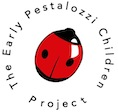The Early Pestalozzi Children Project is recovering the lost story of the first years of the Pestalozzi Children’s Village in Sedlescombe, East Sussex (between 1959 and 1966). They are seeking images relating to the life and activities of the European and Tibetan children who lived on the community’s Oaklands estate.
The British charity was founded by Dr Henry Alexander (a German Jewish former refugee) and Mrs Mary Buchanan, an English former sociologist. The first warden was Mr Eric Bourne (also a former German Jewish refugee).
The charity’s emblem was a two-spot ladybird and huge quantities of lapel pins were sold as fund-raisers.
From its opening in late August 1959 there were regular visits by numerous media bodies, keen to discover the lives led by these European and (later) Tibetan refugee children. We know that a lot of photos were taken showing, meals, play, chores, study, hobbies and other social engagement.
Other events of interest were: the donation of a VW microbus by Volkswagen on 22 August 1959; the interment of a time capsule on 24th October 1960; the formal opening in 1962 of the “International House” designed by Sir Hugh Casson; the annual open day – held on the estate usually around around June; and annual Christmas celebrations.
In December 1961, the BBC ran a ‘Panorama’ programme about the Village, with Richard Dimbleby in attendance. The following year, ITN’s Andrew Gardner covered the community in ‘Roving Report’.
In early 2019 we arranged with BBC South East for a ‘human interest’ piece to be created and aired about our young lives at the Pestalozzi Children’s Village, shortly before the charity sold off the Oaklands estate.
Finally, there were a number of famous people associated as “Patrons” (endorsers/supporters) of the charity – although the children did not see much of them.**
Project website: https://earlypestalozzichildren.org.uk/
If you have any images or features on the above please Contact: [email protected]
